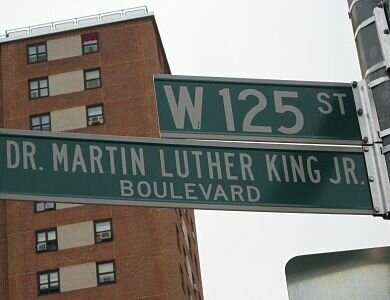For Obama, touring MLK Street would be “the right thing to do”
Featured, Racial Equity — By Hasan Kwame Jeffries on May 19, 2010 at 06:20Drive through the heart of any African American community and you will find a street, avenue, or boulevard named in honor of Dr. Martin Luther King, Jr. Very often, these thoroughfares were once thriving and vibrant corridors of black culture and commerce. Today, typically, they are filled with shuttered homes and boarded-up businesses. The current national economic crisis has exacerbated the problems on MLK Street, worsening downward economic trends that have been in the making for several decades.
It is no secret that African Americans have been deeply and disproportionately affected by the recession. Seemingly every governmental agency and nonprofit organization tracking the recession – from the US House and Senate Joint Economic Committee to AARP – has documented the devastating effect that the recession has had on African Americans.
African American unemployment, for instance, has more than doubled in recent years, jumping from 9% in February 2007 to 19% in February of this year, far outpacing national averages for the general population. And things are likely to get much worse before they get any better because of the disproportionate concentration of African American workers, especially African American males, in vulnerable industries such as auto manufacturing; persistent barriers to employment, ranging from employer discrimination to limited education; and the surge in mass incarceration.
President Obama, however, has steadfastly refused to address specifically the impact that the recession has had on African Americans, choosing instead to pursue “colorblind” policies that are anything but colorblind.
Hundreds of millions of dollars in stimulus money, for instance, have been poured into select job sectors, such as construction, an area in which employers and unions purposefully excluded African Americans (and women) for generations, resulting in an industry that is wholly dominated by white males. Such policies, therefore, directly and disproportionately benefit whites – both white males and families with white male heads of household; these are hardly race neutral policies.
Yet the President says that such policies benefit everyone, including African Americans, and as such, insists that there is no need for recovery policies that target African Americans specifically. This is rising tide economics. Unfortunately, boats can’t rise when they have gaping holes in them, and they certainly can’t rise when they are already underwater.
In recent weeks, the President has made a great show of touring Main Street U.S.A. Just yesterday, he visited the V & M Star Steel factory in Youngstown, Ohio, which is planning a stimulus-supported expansion project that is forecast to create 400 new jobs – in construction. From the factory floor, Obama spoke about the positive impact that his recovery plan has had, stating that, among other things, it was “the right thing to do” to give loans to small businesses and “the right thing to do” to extend unemployment benefits. Obama left Youngstown after the speech.
Ironically, V & M Star isn’t actually located on Main Street. Its address is 2669 Martin Luther King, Jr. Boulevard. Before heading back to Washington, the President should have toured the rest of MLK. In fact, it would have been the right thing to do.
Tags: African-Americans, Barack Obama, Economy, equity, Obama, Politics, Racial Equity, Talking about RaceAuthor: Hasan Kwame Jeffries (9 Articles)

Author of "Bloody Lowndes: Civil Rights and Black Power in Alabama's Black Belt." Hasan is an associate professor of African American history and holds a joint appointment with the Kirwan Institute and the Department of History. Dr. Jeffries specializes in twentieth century African American history and has an expertise in the Civil Rights-Black Power Movement. His current book project investigates the African American Freedom Struggle in Lowndes County, Alabama, which gave birth in 1966 to the Lowndes County Freedom Party, an all Black, independent, political party that was also the original Black Panther Party. His recent publications include "SNCC, Black Power, and Independent Political Party Organizing in Alabama, 1964-1966," which appears in the Journal of African American History (Spring 2006). Dr. Jeffries has received several fellowships in support of his research, including a 2007-2008 Ford Foundation Post-Doctoral Fellowship. Prior to arriving at The Ohio State University in 2003, he was a Bankhead Fellow in the History Department at the University of Alabama. Dr. Jeffries earned his B.A. in History from Morehouse College in 1994, and his M.A. and Ph.D. in African American History from Duke University in 1997 and 2002.



 Share This
Share This Tweet This
Tweet This Digg This
Digg This Save to delicious
Save to delicious Stumble it
Stumble it





 Introduction to Visions 2042: Notes toward a Racial Order Transformed
Introduction to Visions 2042: Notes toward a Racial Order Transformed







